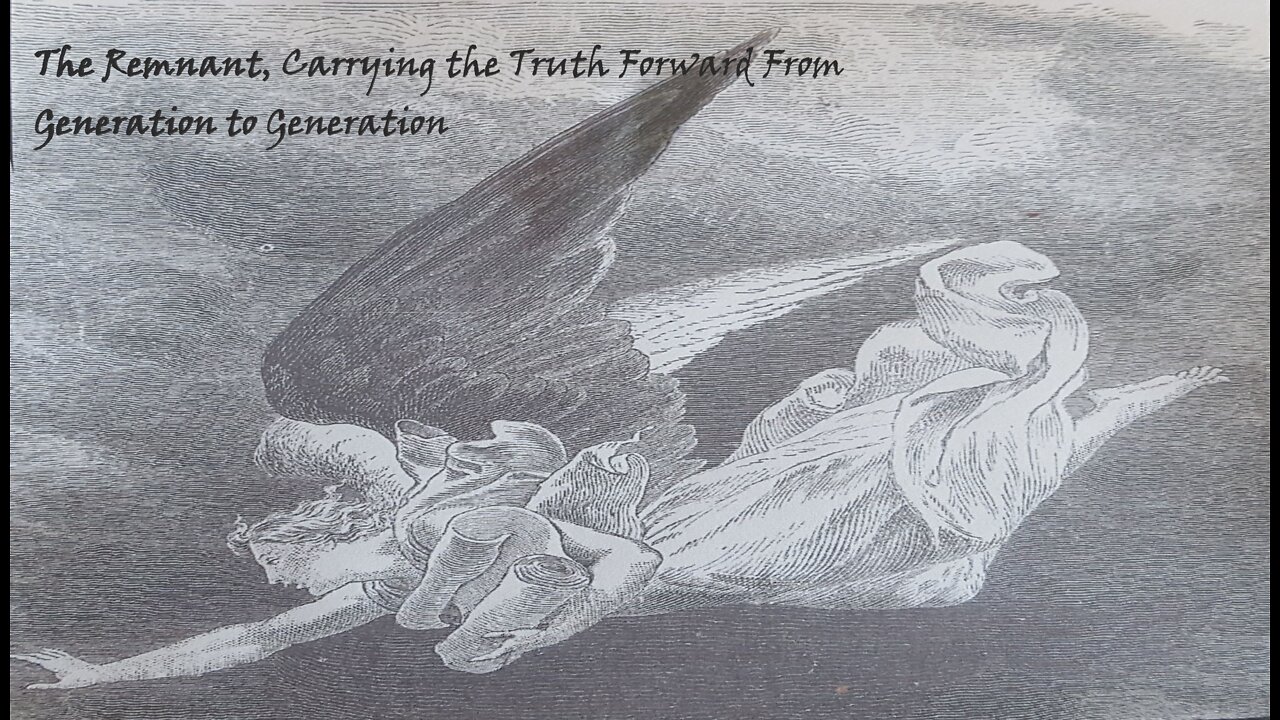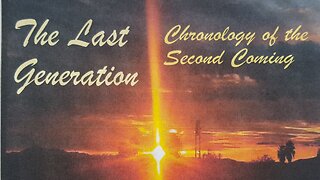Premium Only Content

Soul Sleep after death is it true or false?
Does your soul sleep after death?
I can debunk the doctrine of soul sleep in a few words.
In Luke 16 there is interaction between Lazarus the rich man and Abraham
Interaction-Consciousness...End of story. This in itself contradicts the doctrine of soul sleep
Notice the word "SEE" below? You can’t see if your soul is unconscious.
Philippians 1:23 and Luke 16:26 both contradict soul sleep as well, if you are told you can’t pass from one side of the gulf to the other then you must have the ability to try.
Luke 16:22 And it came to pass, that the beggar died, and was carried by the angels into Abraham's bosom: the rich man also died, and was buried;
23 And in hell he lift up his eyes, being in torments, and seeth Abraham afar off, and Lazarus in his bosom.
24 And he cried and said, Father Abraham, have mercy on me, and send Lazarus, that he may dip the tip of his finger in water, and cool my tongue; for I am tormented in this flame.
25 But Abraham said, Son, remember that thou in thy lifetime receivedst thy good things, and likewise Lazarus evil things: but now he is comforted, and thou art tormented.
26 And beside all this, between us and you there is a great gulf fixed: so that they which would pass from hence to you cannot; neither can they pass to us, that would come from thence.
{As you can see neither the rich man, Lazarus or Abraham is sleeping, they are all conscious.}
Ecclesiastes 12:6 Or ever the silver cord be loosed, or the golden bowl be broken, or the pitcher be broken at the fountain, or the wheel broken at the cistern.
The harpadzo or separation of the flesh body and the spirit
7 Then shall the dust return to the earth as it was: and the spirit shall return unto God who gave it.
Sleep G # 5258 hupnos: sleep Original Word: ὕπνος, ου, ὁ Part of Speech: Noun, Masculine Transliteration: hupnos Phonetic Spelling: (hoop'-nos) Definition: sleep Usage: sleep; fig: spiritual sleep. sleep. From an obsolete primary (perhaps akin to hupo through the idea of subsilience); sleep, i.e. (figuratively) spiritual torpor – sleep.see GREEK hupo
“Sleep” Greek # 5259 by, from, in, of, under, with. A primary preposition; under, i.e. (with the genitive case) of place (beneath), or with verbs (the agency or means, through); (with the accusative case) of place (whither (underneath) or where (below) or time (when (at)) -- among, by, from, in, of, under, with. In the comparative, it retains the same general applications, especially of inferior position or condition, and specially, covertly or moderately. hypó (a preposition) – properly, under, often meaning "under authority" of someone working directly as a subordinate (under someone/something else). [5259 (hypó), before a smooth breathing mark becomes hph.] The authority of Christ made the rich man aware of his failure.
>The best meaning I can come up with for this word sleep is LIMBO. Paradise is a place of holding or LIMBO for unbelievers under Christ’s authority until the next dispensation of time will come to pass. There is nothing that can be accomplished in this state of LIMBO or waiting while in Paradise. In other words the age of grace and teaching will be over.
This is where weeping, gnashing of teeth and being cast into outer darkness come into play. It will seem like an eternity for those who didn’t accept the plan of salvation through Jesus Christ as they are separated by a great gulf from believers in Christ until the Millennium and finally the GWTJ. This is even further proof of consciousness. This in itself contradicts the doctrine of soul sleep. You can’t be aware of your failure unless you are conscious.
There are so many contradictions in the doctrine of soul sleep that defies any semblance of logic.
“Buried” Greek # 2290 Luke 16
thaptó: to bury Original Word: θάπτω Part of Speech: Verb Transliteration: thaptó
Phonetic Spelling: (thap'-to) Definition: to bury Usage: I bury. bury. A primary verb; to celebrate funeral rites, i.e. Inter – bury
Below are our examples of what happens to us at the moment of death and we must look at the second coming within the context of these verses.
7 Then shall the dust return to the earth as it was: and the spirit shall return unto God who gave it.
2 Corinthians 5:6 Therefore we are always confident, knowing that, whilst we are at home in the body, we are absent from the Lord: 7 (For we walk by faith, not by sight:)
8 We are confident, I say, and willing rather to be absent from the body, and to be present with the Lord.
>The word “buried” simply means to “enter” or an event, i.e. burial. Not in the literal sense “with dirt” You have to think in the spirit. Is there dirt in heaven? Not in the literal sense. >How could Lazarus see Abraham if he was literally “buried” with dirt? They are both in Heaven, or “paradise” as Jesus said in Luke 14:23. “This day you will be in paradise” and also Matthew 23:43.
>How could Lazarus see Abraham if he was literally buried with dirt? They are both in Heaven, or “paradise” Jesus said; “This day you will be with me in paradise”
24 And he cried and said, Father Abraham, have mercy on me, and send Lazarus, that he may dip the tip of his finger in water, and cool my tongue; for I am tormented in this flame.
>The rich man was not burning in a cavern of molten lava while everyone in paradise stood by and watched. He was in a state of torment, because he knew he had failed. Have you ever heard some say: it’s hotter than hell as a metaphor? The word hell as it is used here is (Gehnna) Strong’s # 1067 (Greek meaning: a garbage pit outside of Jerusalem at that time. You could say he felt like a piece of garbage for the way he had lived his life. He wasn’t buried in dirt, he wasn’t burning in hot molten lava, he was tormented by his own failure. He was in a state of degradation or decay. He knew he didn’t accept the plan of salvation and was made aware it.
’Hell” G # 1067 geenna: Gehenna, a valley W. and South of Jer., also a symbolic name for the final place of punishment of the ungodly Original Word: γέεννα, ης, ἡ
Part of Speech: Noun, Feminine Transliteration: geenna Phonetic Spelling: (gheh'-en-nah)
Definition: Gehenna, a valley west and South of Jerusalem, also a symbolic name for the final place of punishment of the ungodly Usage: Gehenna, and originally the name of a valley or cavity near Jerusalem, a place underneath the earth, a place of punishment for evil. gehenna, hell. Of Hebrew origin (gay' and Hinnom); valley of (the son of) Hinnom; ge-henna (or Ge-Hinnom), a valley of Jerusalem, used (figuratively) as a name for the place (or state) of everlasting punishment -- hell. see HEBREW gay' see HEBREW Hinnom (Keep in mind this is the final resting place for the flesh and not the spirit)
It is symbolic for the decay of the flesh after it is dead.
“Hell” G # 86 hadés: Hades, the abode of departed spirits Original Word: ᾍδης, ου, ὁ Part of Speech: Noun, Masculine Transliteration: hadés Phonetic Spelling: (hah'-dace) Definition: Hades, the abode of departed spirits Usage: Hades, the unseen world. grave, hell.
From a (as negative particle) and eido; properly, unseen, i.e. "Hades" or the place (state) of departed souls -- grave, hell. see GREEK a see GREEK eido (The disposition of unbelievers in paradise or even their state of mind.) Hades is on the left side of the gulf.
“Hell” H # 7585 sheol: underworld (place to which people descend at death) Original Word: שְׁאוֹלPart of Speech: Noun Feminine Transliteration: sheol Phonetic Spelling: (sheh-ole') Definition: underworld (place to which people descend at death grave, hell, pit
Or shol {sheh-ole'}; from sha'al; Hades or the world of the dead (as if a subterranean retreat), including its accessories and inmates -- grave, hell, pit. see HEBREW sha'al
Ecclesiastes 3:20 All go unto one place; all are of the dust, and all turn to dust again.
Ecclesiastes 12:7 Then shall the dust return to the earth as it was: and the spirit shall return unto God who gave it.
Daniel 12:2 And many of them that sleep in the dust of the earth shall awake, some to everlasting life, and some to shame and everlasting contempt. (2 Timothy 4:1)
Daniel 12:2 is where the confusion begins. When you look at death within the context of Ecclesiastes 12:6 and 7 and also 2 Corinthians 5:8 you have to come to the conclusion DANIEL 12:2 is a metaphor. Nobody is lying in a hole in the ground. The flesh is but the spirit is gone to be with YHVH. Other than Daniel 12:2 there is no other reference to sleeping in the dust after you die. The English does not do this verse justice. The confusion of bodies is very prevalent in Christianity. The flesh body is made up of dust or clay but the spirit is not.
John 6:63 It is the spirit that quickeneth; the flesh profiteth nothing: the words that I speak unto you, they are spirit, and they are life.
1 Corinthians 15:50 Now this I say, brethren, that flesh and blood cannot inherit the kingdom of God; neither doth corruption inherit incorruption.
Galatians 5:17 For the flesh lusteth against the Spirit, and the Spirit against the flesh: and these are contrary the one to the other: so that ye cannot do the things that ye would.
1 Peter 3:18 For Christ also hath once suffered for sins, the just for the unjust, that he might bring us to God, being put to death in the flesh, but quickened by the Spirit:
Ecclesiastes 9:5 For the living know that they shall die: but the dead know not any thing, neither have they any more a reward; for the memory of them is forgotten.
“Slept” H # 3462 yashen: to sleep Original Word: יָשֵׁן Part of Speech: Verb Transliteration: yashen Phonetic Spelling: (yaw-shane') Definition: to sleep to be slack or languid, grow oldA primitive root; properly, to be slack or languid, i.e. (by implication) sleep (figuratively, to die); also to grow old, stale or inveterate:
“Slept” H # 5123 Strong's Concordance num: to be drowsy, slumber Original Word: נוּם Part of Speech: Verb Transliteration: num Phonetic Spelling: (noom) Definition: to be drowsy, slumber sleep, slumber A primitive root; to slumber (from drowsiness) -- sleep, slumber. (Literally sleeping but in the flesh)
Palms 146:4 His breath goeth forth, he returneth to his earth; in that very day his thoughts perish.
His thoughts perish because the dead body remembers nothing. The spirit remembers everything.
Luke 8:52 And all wept, and bewailed her: but he said, Weep not; she is not dead, but sleepeth.
Her body is not dead but she is merely sleeping or unconscious and only applies to the flesh body and not to the spirit body.
The word slept is used over 50 times in the OT and most of the time it is used as a pronoun or giving the name of somebody that died.
Summation
The doctrine of soul sleep is a fundamental misunderstanding of the nature of the celestial body and the terrestrial body and the two must not be conflated.
MV 2022 TheRemnantSeed
-
 28:21
28:21
RemnantSeed
1 year agoPre Mid or Post Tribulation?
1.34K2 -
 1:03:47
1:03:47
TheCrucible
3 hours agoThe Extravaganza! EP: 66 (11/25/25)
67.2K10 -
 1:58:47
1:58:47
Redacted News
4 hours ago"What I saw in Ukraine SHOOK me to my core" Ukraine is not a democracy, it never was | Redacted
102K51 -
 LIVE
LIVE
GritsGG
6 hours ago#1 Most Warzone Wins 4049+!
56 watching -
 LIVE
LIVE
MOONTV69
6 hours ago🔴LIVE - MARVEL RIVALS - GAMBIT LORD GRIND!! (PC)
47 watching -
![Moonlighter 2: The Endless Vault - First Look! [PC]](https://1a-1791.com/video/fww1/bc/s8/1/w/x/p/w/wxpwz.0kob.2-small-Gaming-with-Profitz-LIVE.jpg) LIVE
LIVE
ProfitzTV
3 hours agoMoonlighter 2: The Endless Vault - First Look! [PC]
22 watching -
 7:24:37
7:24:37
Dr Disrespect
9 hours ago🔴LIVE - DR DISRESPECT - ARC RAIDERS - RANDOM SQUADS
142K11 -
 1:54:06
1:54:06
Russell Brand
5 hours agoHas he done it? Ukraine Accepts Core Peace Terms — Nobel Prize incoming? - SF655
125K16 -
 24:37
24:37
Stephen Gardner
5 hours agoTrump JUST Exposed 2 HUGE LIES meant to TAKE HIM DOWN!!
31.2K37 -
 1:09:52
1:09:52
vivafrei
5 hours agoCBS News "Debunks" The Blaze Pipe Bomber Story? Thomas Massie Threatened by Kash Patel? AND MORE!
52.3K29